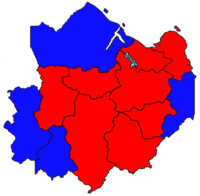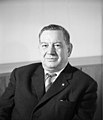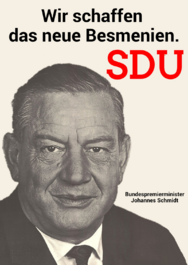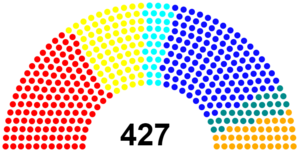1968 Besmenian federal election: Difference between revisions
m (Text replacement - "Prime Minister of Besmenia|Prime Minister" to "Premier of Besmenia|Premier") |
Neuleinster (talk | contribs) No edit summary |
||
| Line 243: | Line 243: | ||
The '''1968 Besmenia federal election''' was held on January 14, 1968 in [[Besmenia]]. | The '''1968 Besmenia federal election''' was held on January 14, 1968 in [[Besmenia]]. | ||
It was the first election to the [[Federal Chamber (Besmenia)|Federal Chamber]] after the [[Besmenian reunification]] in September 1967. It was also the first ever snap election in the history of the Federal Republic of Besmenia, after the Besmenian government under [[Premier of Besmenia|Premier | It was the first election to the [[Federal Chamber (Besmenia)|Federal Chamber]] after the [[Besmenian reunification]] in September 1967. It was also the first ever snap election in the history of the Federal Republic of Besmenia, after the Besmenian government under [[Premier of Besmenia|Premier [[Johannes Schmidt]] decided to hold the elections originally held in September 1968 in January 1968 in order to democratically integrate West Besmenia into parliament as quickly as possible. This was possible after the Federal Chamber decided in 1960 to allow snap elections. Before that, the [[Basic Law of Besmenia|Basic Law]] did not allow snap elections. The statutory membership of the Federal Chamber was increased to 427 MPs. | ||
The parties SDU, BVP, FBBP and BRP previously represented in the Federal Chamber all lost votes. The new parties DB and BELP managed to enter parliament by clearing the 5% hurdle. With the entry of DB and BELP, more than four parties were elected to the Federal Chamber for the first time since 1936. Only four parties were represented there between 1940 and 1968. | The parties SDU, BVP, FBBP and BRP previously represented in the Federal Chamber all lost votes. The new parties DB and BELP managed to enter parliament by clearing the 5% hurdle. With the entry of DB and BELP, more than four parties were elected to the Federal Chamber for the first time since 1936. Only four parties were represented there between 1940 and 1968. | ||
Revision as of 18:23, 28 November 2024
| |||||||||||||||||||||||||||||||||||||||||||||
427 seats 214 seats needed for a majority | |||||||||||||||||||||||||||||||||||||||||||||
|---|---|---|---|---|---|---|---|---|---|---|---|---|---|---|---|---|---|---|---|---|---|---|---|---|---|---|---|---|---|---|---|---|---|---|---|---|---|---|---|---|---|---|---|---|---|
| |||||||||||||||||||||||||||||||||||||||||||||
 Strongest party by state | |||||||||||||||||||||||||||||||||||||||||||||
The 1968 Besmenia federal election was held on January 14, 1968 in Besmenia.
It was the first election to the Federal Chamber after the Besmenian reunification in September 1967. It was also the first ever snap election in the history of the Federal Republic of Besmenia, after the Besmenian government under [[Premier of Besmenia|Premier Johannes Schmidt decided to hold the elections originally held in September 1968 in January 1968 in order to democratically integrate West Besmenia into parliament as quickly as possible. This was possible after the Federal Chamber decided in 1960 to allow snap elections. Before that, the Basic Law did not allow snap elections. The statutory membership of the Federal Chamber was increased to 427 MPs.
The parties SDU, BVP, FBBP and BRP previously represented in the Federal Chamber all lost votes. The new parties DB and BELP managed to enter parliament by clearing the 5% hurdle. With the entry of DB and BELP, more than four parties were elected to the Federal Chamber for the first time since 1936. Only four parties were represented there between 1940 and 1968.
The 1968 Besmenian capital city referendum also took place on the same day.
Background
Electoral system
Contesting parties
Prime Minister candidate of the parties
SDU
BVP
FBBP
BRP
BELP
DB
Campaign
This was the first election to the Federal Chamber conducted after Besmenian reunification which took place on 14 September 1967. Previously, the National Assambly, West Besmenia's parliament, had selected 205 of its members which were then co-opted as Members of the East Besmenian parliament and served until the end of the 12th Federal Chamber.
Results
| Party | Votes | % | Seats | |
|---|---|---|---|---|
| Social Democratic Union | 30,7 | 132 | ||
| Besmenian People's Party | 29,2 | 128 | ||
| Free Besmenian Citizen's Party | 16,9 | 74 | ||
| Besmenian Republican Party | 8,4 | 37 | ||
| Democratic Besmenia | 6,8 | 29 | ||
| Besmenian Libertarian Party | 6,2 | 27 | ||
| Other parties | 2,4 | 0 | ||
| Total | 100 | 427 | ||
| Invalid/blank votes | – | |||
| Registered voters/turnout | 92,03 | – | ||
Government formation
- Federal government: 260
- Opposition: 167
- Federal government: 132
- Confidence and supply: 103
- Opposition: 192
The previous SDU-BVP coalition was continued after the 1968 election. After the right-wing populist politician Robert Gleitzmann was elected BVP chairman on 31 March, 1969, Schmidt announced the termination the SDU-BVP coalition. Even before that, Gleitzmann had criticized Schmidt's leadership and the economic policy under the SDU-BVP federal government. After talks between the two parties, the BVP decided to leave the government and went into opposition. The BVP members left the government on 10 April. In order not to hold snap elections, the SDU held talks with the FBBP and DB, with the result that the FBBP and DB agreed to support an SDU minority government. Schmidt's third cabinet was inaugurated on 6 May.







